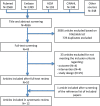The influence of social networking sites on health behavior change: a systematic review and meta-analysis
- PMID: 25005606
- PMCID: PMC4433372
- DOI: 10.1136/amiajnl-2014-002841
The influence of social networking sites on health behavior change: a systematic review and meta-analysis
Abstract
Objective: Our aim was to evaluate the use and effectiveness of interventions using social networking sites (SNSs) to change health behaviors.
Materials and methods: Five databases were scanned using a predefined search strategy. Studies were included if they focused on patients/consumers, involved an SNS intervention, had an outcome related to health behavior change, and were prospective. Studies were screened by independent investigators, and assessed using Cochrane's 'risk of bias' tool. Randomized controlled trials were pooled in a meta-analysis.
Results: The database search retrieved 4656 citations; 12 studies (7411 participants) met the inclusion criteria. Facebook was the most utilized SNS, followed by health-specific SNSs, and Twitter. Eight randomized controlled trials were combined in a meta-analysis. A positive effect of SNS interventions on health behavior outcomes was found (Hedges' g 0.24; 95% CI 0.04 to 0.43). There was considerable heterogeneity (I(2) = 84.0%; T(2) = 0.058) and no evidence of publication bias.
Discussion: To the best of our knowledge, this is the first meta-analysis evaluating the effectiveness of SNS interventions in changing health-related behaviors. Most studies evaluated multi-component interventions, posing problems in isolating the specific effect of the SNS. Health behavior change theories were seldom mentioned in the included articles, but two particularly innovative studies used 'network alteration', showing a positive effect. Overall, SNS interventions appeared to be effective in promoting changes in health-related behaviors, and further research regarding the application of these promising tools is warranted.
Conclusions: Our study showed a positive effect of SNS interventions on health behavior-related outcomes, but there was considerable heterogeneity. Protocol registration The protocol for this systematic review is registered at http://www.crd.york.ac.uk/PROSPERO with the number CRD42013004140.
Keywords: Behavior Change; Consumer Health; Social Media; Social Network; Social Networking Site.
© The Author 2014. Published by Oxford University Press on behalf of the American Medical Informatics Association. All rights reserved. For Permissions, please email: journals.permissions@oup.comFor numbered affiliations see end of article.
Figures
References
-
- Boyd DM, Ellison NB. Social network sites: definition, history, and scholarship. J Comput Commun 2007;13:210–30.
-
- Pew Research Center. Social Media Update. 2013. http://www.pewinternet.org/2013/12/30/social-media-update-2013/ (accessed 3 Mar 2014).
-
- Pew Research Center. Social Networking Fact Sheet. 2013. http://www.pewinternet.org/fact-sheets/social-networking-fact-sheet/ (accessed 3 Mar 2014).
-
- http://newsroom.fb.com/company-info/ (accessed 3 Mar 2014).
-
- Twitter, by the numbers. 2013. http://news.yahoo.com/twitter-statistics-by-the-numbers-153151584.html (accessed 4 Mar 2014).
Publication types
MeSH terms
LinkOut - more resources
Full Text Sources
Other Literature Sources
Miscellaneous



